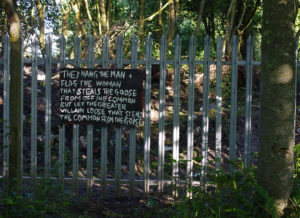The eighteenth and nineteenth centuries witnessed widespread attempts to ‘privatise’ rural England. By enclosing common land and extinguishing customary rights, rural elites sought to physically reshape and culturally redefine the countryside. In counties such as Somerset and Dorset, labourers increasingly found themselves barred from entering the fields and woodland that had supported their families for generations. Meanwhile, those who attempted to voice their concerns regarding these changes were portrayed by the landowners as supporting a working-class culture of ‘sloth’ and ‘insubordination’. The cultural legacies of this Agricultural Revolution have persisted until the modern day, with many accounts portraying the struggle against enclosure as one of necessary progress against backwards traditionalism.
However, recent historical research has suggested that a powerful set of ‘plebeian environmental ethics’ existed in rural England, governing how rural workers envisioned and interacted with their local landscapes. Consequently, this talk will reveal how countryfolk constructed their own ‘moral ecologies’ to oppose landscape change. The belief in a ‘morally correct’ state for the local environment drove protests such as trespass, arson, hedge-breaking and tree-maiming. By materially and symbolically reverting rural landscapes to their pre-enclosure state, these acts of resistance offered tangible reconstructions of threatened lives and customary practices. The rural poor did not simply resist landscape change due to economic concerns but also because enclosure threatened what they believed to be the ethical relationship between men, masters and the environment.

Event details
Date: , 2019
Time: to
Location: Level 1, Studio 2
Venue: M Shed, BS1 4RN
Price: Free
With: Leonard Baker




